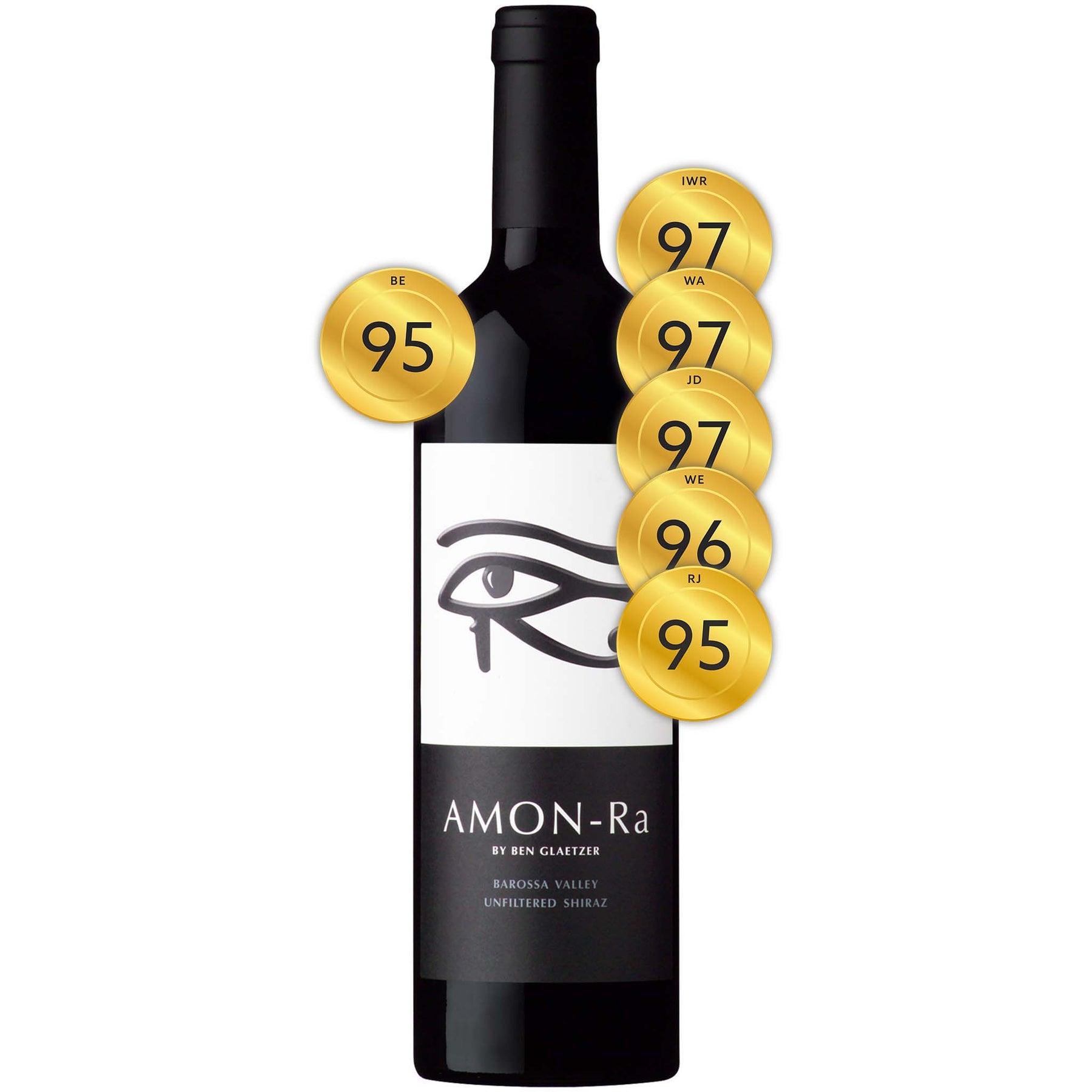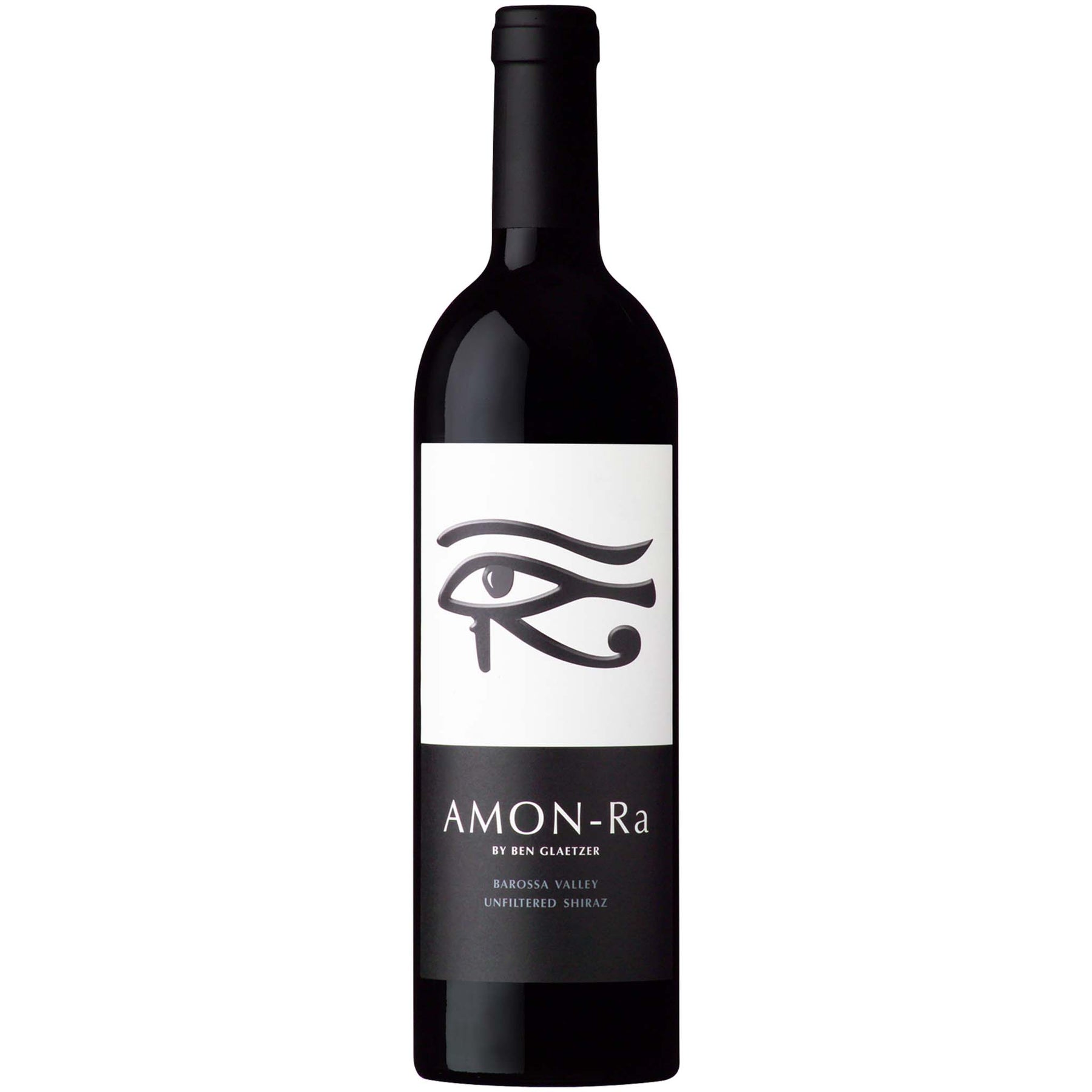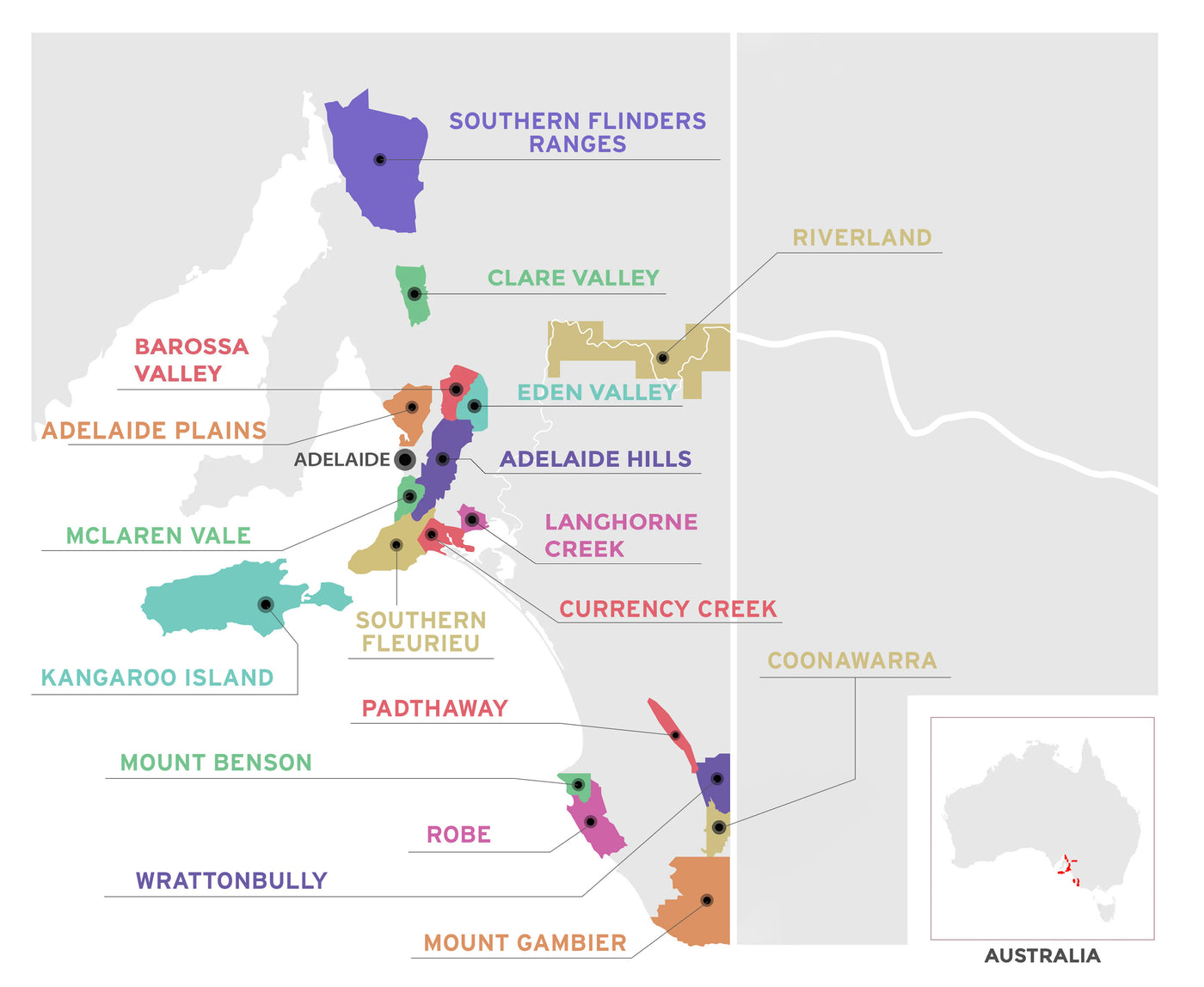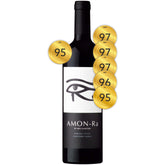

Glaetzer Amon-Ra Barossa Shiraz 2010
Style: Red Wine
Variety: Shiraz
Closure: Cork
Glaetzer Amon-Ra Barossa Shiraz 2010
Warehouse
34 Redland Drive
Vermont VIC 3133
Australia
Critic Score: 97
Alcohol: 15.1%
Size: 750 ml
Drink by: 2040
"Ben Glaetzer is a serious talent who has exploded on the wine scene with a brilliant array of wines." Robert Parker
Glaetzer Amon-Ra is a benchmark Barossa Valley shiraz made by master winemaker Ben Glaetzer. Fruit is sourced from exceptional old vines in the famed Ebenezer sub-region in the northern part of the Barossa Valley. Vine age varies from 35 years to over 130 years of age. Amon-Ra is Glaetzer's flagship wine and in addition to being a shiraz of monumental proportions, it displays a freshness and purity of fruit that are the hallmarks of Ben Glaetzer's wines.
"Wow, a spectacular Shiraz and possibly the wine of the 2010 vintage. It sports knockout aromatics of creamy blackberry, plum, smoked bacon, coffee, and spice that just soar from the glass. Classic aromatically, with textbook Barossa qualities, the quality shines just as much on the palate, where the wine is full-bodied, perfectly textured and rich, with a savory mid-palate, ripe, chewy tannin, and a clean finish. This impresses all around and is hard to fault. While spectacular now, it will shine for two decades." Jeb Dunnuck
"Dark purple with youthful hues on release, the nose is a compelling mix of dark stone fruits, coffee and blackberries. The 2010 is supremely focussed yet rich and rewarding on the palate. The flavours are intense yet restrained, showing brooding dark fruit characters, with cracked pepper hints, some minerality and great complexity. The astounding purity of expression and multi layered structure will allow this wine to mature with elegance for decades to come." Glaetzer Wines
Expert reviews
"Wow, a spectacular Shiraz and possibly the wine of the vintage, the 2010 Glaetzer Shiraz Amon-Ra Barossa Valley is 100% dry-grown Shiraz that was aged for 16 months in 100% new oak (95% French and 5% American). It sports knockout aromatics of creamy blackberry, plum, smoked bacon, coffee, and spice that just soar from the glass. Classic aromatically, with textbook Barossa qualities, the quality shines just as much on the palate, where the wine is full-bodied, perfectly textured and rich, with a savory mid-palate, ripe, chewy tannin, and a clean finish. This impresses all around and is hard to fault. While spectacular now, it deserves 3-4 years in the cellar, and will shine for two decades." Jeb Dunnuck - 97 points
"The 2010 Glaetzer Amon-Ra is a thrilling, yet intense wine, bringing both power and finesse. The dark, opaque glass staining color is the first character this wine exhibits before the intoxicating aromas of pure ripe blackberry, sweet cassis, exotic spices, cracked pepper, pine sap and molasses all combine crushed violets and mineral nuances adding freshness to this powerful wine. Full, rich and densely concentrated, but kept fresh, getting nice lift from the underlying acidity. Balanced and structured showing amazing depth and complexity all the way into the explosive mouth-watering finish where the juicy dark fruits don't let up. The 100% Shiraz spent 16 months in 100% new oak. Outstanding." International Wine Review - 97 points
"Deep purple-black in color, the 2010 Amon-Ra is very closed on the nose showing pure black fruits, chocolate and licorice with just a touch of loam. Full-bodied and densely packed, the voluptuous palate is framed by firm, fine tannins and a crisp acid line. It has a long, well-balanced finish. Drink it from 2014-2026+." Lisa Perrotti-Brown MW, Wine Advocate - 97 points
"Despite this wine's weight and richness, it retains a superb sense of balance and structure. Firm acids and tannins support the blueberry fruit, while savory notes of mocha and roasted meat provide added dimension. Give it a few years in the cellar and drink it from 2015–2025." Joe Czerwinski, Wine Enthusiast - 96 points
"Hugely concentrated but wonderfully supple and subtle at the same time. Nose has a slight perfume of red berry and spices with some subtle earthy overtones. Sweet fruit characters on the palate are supported by supple, ripe tannins. It is a remarkably elegant and stylish Barossa red, with so much to like. And it will continue to improve with further cellaring. Perfect with rare rib-eye." Ray Jordan, Pick of the Week – 95 points
"This wine is impenetrable in colour; the bouquet is a melange of black fruits, oak, spice, tar and licorice; the palate reveals even more dark fruits, more depth, in fact, more of everything, and that is the essence of the wine; this will go the distance, and if you like impressive wines, then search no further. Drink by: 2050." Ben Edwards, Halliday Wine Companion - 95 points
About Ben Glaetzer

"When I look at the winemaker behind some of my favourite Australian wines, the name Ben Glaetzer seems to come up frequently. He is a serious talent who has exploded on the wine scene with a brilliant array of wines." Robert Parker
The irrepressible Ben Glaetzer is the driving force behind both Glaetzer, Heartland and Mitolo Wines. Glaetzer Wines, the sole family company, was set up by his father Colin in 1995 and makes red wines from ancient vines in the Barossa Valley. Heartland Wines, which makes less expensive wines from Langhorne Creek and Limestone Coast, was set up by Ben and fellow winemaker Scott Collett in the late 1990s. Then there’s Mitolo Wines, which focuses on McLaren Vale, which was set up in 2000 by Ben and horticulturalist Frank Mitolo.
Ben's early experience in the wine industry was working as a cellarhand at Barossa Valley Estates during school and university holidays. He originally had aspirations to be a pediatric surgeon – "I wanted to have an impact, but I didn’t want to fix sick people all the time." But the smells and sounds of the winery at vintage drew him back. "I’d been working vintages for 10 or 12 years. I came from a pretty ordinary medical lecture and walked into the winery and thought, it doesn’t get better than this." So he switched to studying winemaking at Roseworthy, Adelaide University’s agricultural college.
After graduation, Ben worked in the Hunter Valley at Tyrrell's and travelled extensively through the world’s wine regions. In 1998, he returned to the Barossa and joined his father’s business. The family’s day-to-day business is its high volume winemaking operation at the Glaetzer winery, which is able to crush 10,000 tons of grapes each vintage. 30–40% of the crush is Glaetzer/Heartland/Mitolo, the three projects that Ben puts his name to, and the balance is contract work on behalf of numerous clients. In the 2005 vintage, a staggering 1,300 different wines were made in their winery from almost 30 different grape varieties. This was a training ground for a young winemaker like no other.
Ben took over Glaetzer in 2002. Bruce Tyrrell says, "He was always going to have his own business and label. In the winery, he had great attention to detail, and a top palate."
That palate, and his exposure to the wines of the world, has turned him away from the traditional Barossa style of his father. "I took over the family company in 2002, and the style change has been marked. The 1980s saw a burst of Chardonnays that had undergone malolactic fermentation, which were rich, full and died. People have moved on since then and in the Barossa they are now making more global wines. Winemakers have been travelling more, and are eating better food and tasting more imported wines," says Ben.
Oak use has been the biggest change. He describes the old style as, "a definitive Australian style, derived from secondary characteristics: toasty oak and vanilla. People are now being more selective about what they are using. It doesn’t matter whether it is American or French." In the winery oak is used as a structural component, not as a flavouring component.
When it comes to wine style, the Glaetzer hallmark is purity of fruit. "I'm looking for animated fruit. Wines have to stay alive. I want the fruit to smell fresh, alive and animated." His ability to blend traditional winemaking techniques with a modern flair is reflected in the style of all of his wines.
Over the years, Ben's chalked up some prestigious winemaking honours, including Behind the Label New World Winemaker of the Year 2006, Qantas Young Winemaker of the Year 2004 and Robert M. Parker Jnr’s Wine Personality of the Year 2005.
About the winery

The Glaetzer family settled in Nuriootpa in the Barossa Valley in 1888 after emigrating from Brandenburg, Germany. They were some of the earliest recorded viticulturalists in the Barossa Valley. Over a century later, in 1995, winemaking patriarch Colin Glaetzer established Glaetzer Wines.
Colin completed an agriculture degree in 1968 and an oenology degree in 1970 and then gained winemaking experience overseas and in many of Australia's noted wine regions. In 1985 he moved to the Barossa Valley to run Barossa Valley Estate, where he created the now revered E & E Black Pepper Shiraz and the Ebenezer range of wines. After 30 years of winemaking experience, the establishment of Glaetzer Wines allowed him to produce boutique super premium wines under a family owned label.
Colin's son, Ben, worked as a cellarhand at Barossa Valley Estates during school and university holidays. He had aspirations to be a pediatric surgeon – "I wanted to have an impact, but I didn’t want to fix sick people all the time." But the smells and sounds of the winery at vintage drew him back. "I’d been working vintages for 10 or 12 years. I came from a pretty ordinary medical lecture and walked into the winery and thought, it doesn’t get better than this." So he switched to studying winemaking at Roseworthy, Adelaide University’s agricultural college.
After graduation, Ben worked in the Hunter Valley at Tyrrell's and travelled extensively through the world’s wine regions. In 1998, he returned to the Barossa and joined his father’s business. The family’s day-to-day business is its high volume winemaking operation at the Glaetzer winery, which is able to crush 10,000 tons of grapes each vintage. 30–40% of the crush is Glaetzer/Heartland/Mitolo, the three projects that Ben puts his name to, and the balance is contract work on behalf of numerous clients.
Ben took over winemaking at Glaetzer in 2002. The Glaetzer mission is to focus on the production of small-volume, super premium wines from the small Ebenezer sub-region in the northern part of the Barossa Valley. Fruit is sourced from a loyal group of third- and fourth-generation Barossa grape growers who own around 260 hectares of vineyards, so this is as terroir-specific as winemaking gets. Vine age varies from 35 years to over 130 years of age.
The older vineyards are divided into blocks, each with different measured parameters. But despite the degree of science behind it, he has little truck with winemakers who depend only on laboratory analysis for making decisions. "I admit I don’t want to see the analysis; I just want to taste. There’s a window of perhaps four days between physiologically un-ripe, and over-cooked fruit in the Barossa, but I pick on ripeness of tannins and taste, not analysing the ripeness of the fruit and sugars."
Glaetzer produce four wines in their portfolio; the Wallace Shiraz Grenache, Bishop Shiraz, Anaperenna Shiraz Cabernet and the flagship Amon-Ra Shiraz. In 2016, they also released a very small quantity of their first 'perfect' wine, The Eye of Ra Shiraz, made from the finest parcel of fruit off the Ebenezer vineyard.


South Australia
South Australian is responsible for more than half the production of all Australian wine. It is home to more than 900 wineries across 18 wine regions. The regions are Adelaide Hills, Adelaide Plains, Barossa Valley, Clare Valley, Coonawarra, Currency Creek, Eden Valley, Kangaroo Island, Langhorne Creek, McLaren Vale, Mount Benson, Mount Gambier, Padthaway, Riverland, Robe, Southern Fleurieu, Southern Flinders Ranges and Wrattonbully.
Many of the well-known names in the South Australian wine industry established their first vineyards in the late 1830s and early 1840s. The first vines in McLaren Vale were planted at Reynella in 1839 and Penfold's established Magill Estate on the outskirts of Adelaide in 1844.
South Australia has a vast diversity in geography and climate which allows the State to be able to produce a range of grape varieties - from cool climate Riesling in the Clare and Eden Vallies to the big, full bodied Shiraz wines of the Barossa Valley and McLaren Vale. Two of Australia's best-known wines, Penfolds Grange and Henschke Hill of Grace, are produced here. There is much to discover in South Australia for the wine lover.

